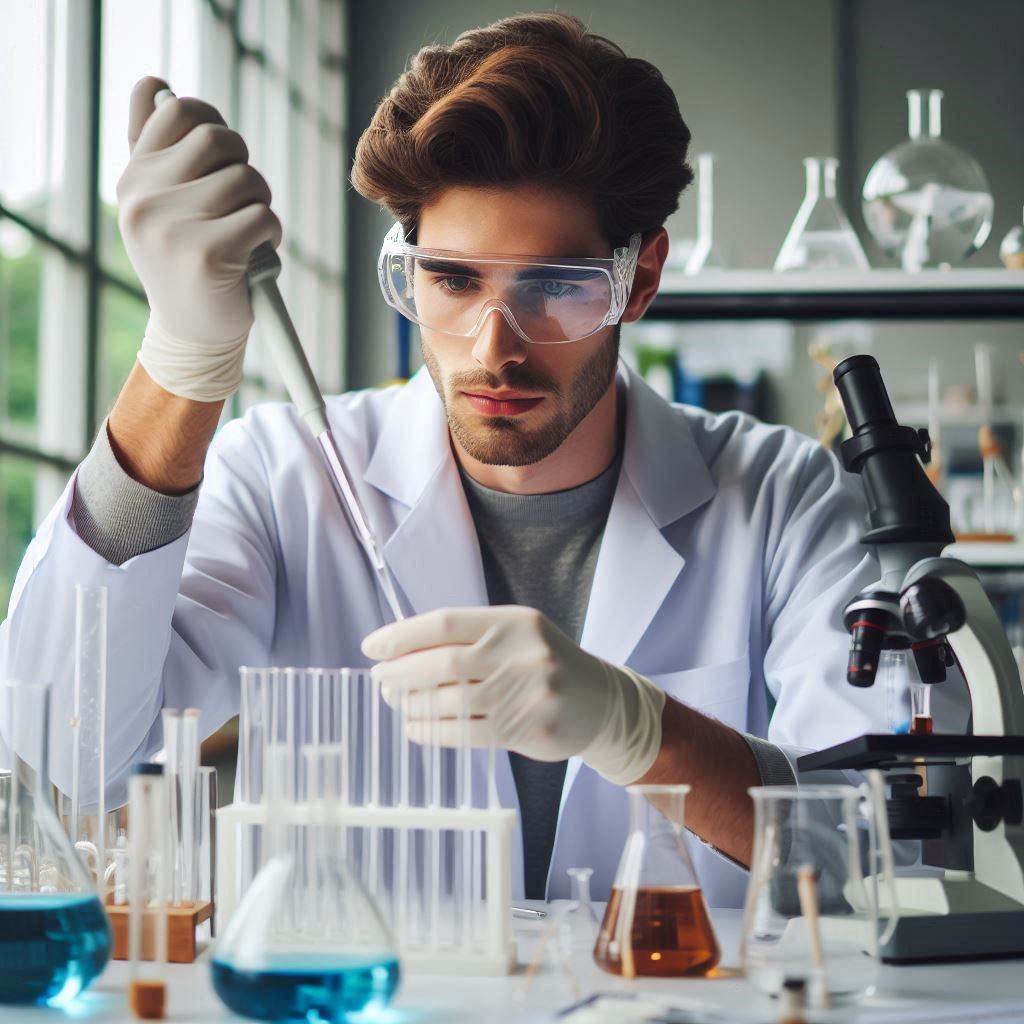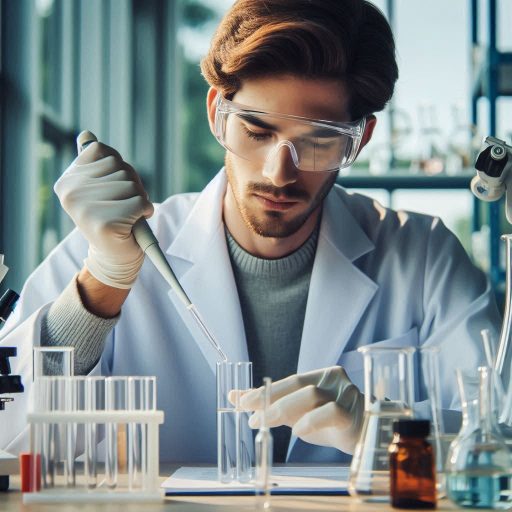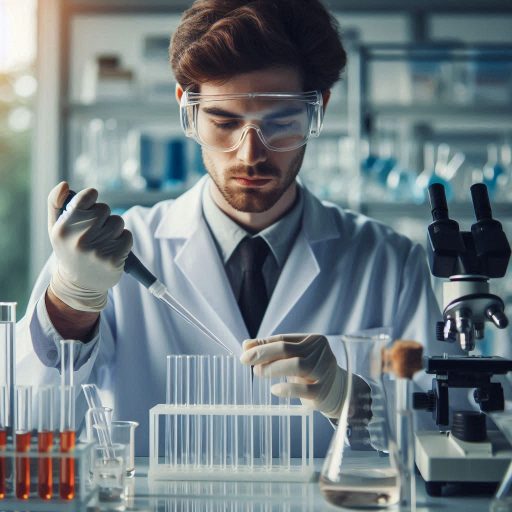Introduction
Briefly Introduce the Role of a Lab Technician
Lab technicians play a crucial role in various industries, including healthcare and research.
They handle, analyze, and interpret laboratory samples to aid in diagnosing diseases or conducting experiments.
Their responsibilities include preparing samples, operating complex equipment, and ensuring accurate test results.
Technicians must be detail-oriented and skilled in various laboratory techniques to perform their tasks effectively.
The Importance of Work Environments in the Field
The work environment of a lab technician significantly impacts their efficiency and job satisfaction.
A well-organized and safe workspace enhances productivity and reduces the likelihood of errors.
Proper ventilation, adequate lighting, and cleanliness are vital for accurate results and safety.
A supportive work environment also fosters professional growth and ensures compliance with health regulations.
The Different Types of Work Environments to Be Discussed
Lab technicians work in diverse settings, each with unique characteristics and requirements.
This section explores several key work environments for lab technicians.
We will cover hospital laboratories, research facilities, clinical labs, and industrial labs.
Understanding these environments helps in appreciating the varied roles and challenges faced by lab technicians.
Each setting offers different opportunities and demands, shaping the technician’s daily tasks and work conditions.
Hospital Labs
Description of the Typical Hospital Lab Setting
Hospital labs are dynamic environments where lab technicians work with a wide range of equipment and technology.
These labs often feature multiple workstations dedicated to different types of tests, including hematology, chemistry, and microbiology.
Technicians use sophisticated machinery to perform tests and analyze samples.
They also manage various specimens, from blood and urine to tissues.
The lab is usually organized to facilitate a smooth workflow, with areas designated for specimen reception, processing, and analysis.
Technicians are expected to follow strict protocols and maintain a clean, organized workspace to ensure accurate results and safety.
The Fast-Paced Nature of Hospital Labs
Hospital labs operate at a rapid pace, driven by the need for timely results in critical situations.
Technicians often face high-pressure scenarios, such as emergency cases where test results are urgently needed.
The fast-paced nature requires technicians to work quickly and efficiently while maintaining accuracy.
They handle a constant stream of samples and may need to multitask to manage various testing processes simultaneously.
Quick decision-making and adaptability are crucial skills in this environment.
The ability to work under pressure while ensuring high-quality results is essential for maintaining patient care and supporting medical teams.
The Importance of Efficiency and Accuracy in This Environment
Efficiency and accuracy are paramount in hospital labs.
Technicians must process and analyze samples promptly to aid in diagnosis and treatment decisions.
Any delay or error can impact patient outcomes, making it critical to follow precise protocols and double-check results.
Technicians use advanced technology and software to enhance accuracy but must also rely on their skills and experience.
Effective communication with other medical staff ensures that results are delivered in a timely manner.
In this environment, a high level of organization and attention to detail is crucial for maintaining the lab‘s efficiency and supporting overall patient care.
Read: How to Become a CAD Technician: Step-by-Step Guide
Research Labs
The Focus on Experimentation and Innovation in Research Labs
Research labs are hubs of experimentation and innovation.
Lab technicians in these environments work on cutting-edge projects that push scientific boundaries.
Their tasks often involve developing new techniques, testing hypotheses, and refining experimental protocols.
This focus on innovation drives the discovery of new knowledge and solutions.
Technicians may work with advanced technologies and methodologies, contributing to significant scientific advancements.
The experimental nature of these labs requires adaptability and a keen interest in exploring uncharted scientific territories.
The results of their work often lead to groundbreaking discoveries and technological advancements that impact various fields.
The Collaborative Nature of Research Lab Environments
Collaboration is a cornerstone of research lab environments.
Lab technicians frequently work alongside scientists, researchers, and other technicians.
This teamwork fosters a dynamic atmosphere where ideas are shared and refined.
Communication and cooperation are essential for successful project outcomes.
Technicians often participate in group meetings, brainstorming sessions, and joint experiments.
This collaborative approach enhances problem-solving and innovation.
By working closely with a diverse team, technicians gain valuable insights and contribute to a collective goal.
The interaction within research labs creates a stimulating environment that supports both individual and team achievements.
The Opportunities for Professional Growth and Development in Research Labs
Research labs offer ample opportunities for professional growth and development.
Technicians can advance their skills through exposure to cutting-edge research and advanced technologies.
Many labs support continuous learning through workshops, seminars, and on-the-job training.
Career advancement in research labs often includes roles such as lead technician or research coordinator.
These positions involve greater responsibility and opportunities for leadership.
Technicians may also pursue further education or specialized certifications to enhance their expertise.
The dynamic nature of research labs ensures that technicians remain engaged and challenged.
This environment supports career progression and personal development in the field.
Read: Surveying and Mapping Technician Internships: A Guide
Public Health Labs
The Role of Lab Technicians in Public Health Labs
Lab technicians in public health labs play a crucial role in monitoring and analyzing public health data.
They conduct tests to detect pathogens, toxins, and other health hazards in various samples.
Their work involves preparing samples, operating sophisticated lab equipment, and performing complex assays.
Technicians must follow strict protocols to ensure accurate results.
They collaborate with epidemiologists and other health professionals to interpret test results and provide critical information.
This information helps guide public health responses and interventions.
Disease Prevention and Control in This Environment
In public health labs, disease prevention and control are top priorities.
Technicians focus on identifying infectious agents that could cause outbreaks.
They analyze samples from diverse sources, including water, food, and patient specimens, to detect potential threats.
By identifying and tracking pathogens, they help prevent the spread of diseases.
Their work supports vaccination programs and public health campaigns aimed at reducing disease incidence.
Regular surveillance and testing are essential for early detection of emerging health threats and for controlling disease spread.
The Impact of Public Health Lab Work on Communities and Populations
The impact of public health lab work on communities is profound.
Technicians contribute to the health and safety of entire populations by ensuring that potential health risks are identified and managed.
Their findings help shape public health policies and safety regulations.
For instance, detecting an outbreak early can lead to swift containment measures, reducing the risk of widespread illness.
Public health lab work also supports research that informs health education and prevention strategies.
Overall, these labs play a vital role in maintaining community health and improving quality of life.
In summary, public health lab technicians are integral to disease prevention and control efforts.
Their work has a significant impact on community health, helping to safeguard populations from potential health threats.
Read: Impact of Drones on Surveying and Mapping

Diagnostic Labs
Diagnostic labs play a crucial role in the healthcare industry by focusing on diagnosing and treating diseases.
These labs are equipped with state-of-the-art technology and skilled lab technicians who work together to provide accurate and timely results to healthcare professionals and patients.
Focus on Diagnosing and Treating Diseases
- Diagnostic labs are specifically designed to perform a wide range of tests and procedures to aid in the diagnosis and treatment of various diseases.
- Lab technicians in diagnostic labs are responsible for analyzing samples such as blood, urine, tissue, and other bodily fluids to detect the presence of pathogens, abnormal cells, or chemical imbalances that could indicate a disease.
- These labs utilize advanced instruments and techniques to ensure precise and reliable results, which are essential for healthcare providers to make informed decisions about a patient’s health and treatment plan.
Variety of Tests and Procedures
- Diagnostic labs offer a wide variety of tests and procedures, including blood tests, genetic testing, imaging studies, microbiology cultures, and more.
- Each test and procedure has unique requirements and protocols that lab technicians must follow to ensure accurate results and maintain the integrity of the samples.
- Lab technicians in diagnostic labs are trained to handle a diverse range of tests, from routine screenings to complex genetic analyses, with precision and efficiency.
Importance of Communication and Collaboration
- In diagnostic labs, effective communication and collaboration with healthcare professionals are essential to ensure proper sample collection, handling, and result interpretation.
- Lab technicians often work closely with physicians, nurses, and other healthcare providers to discuss test results, interpret findings, and recommend further testing or treatment options for patients.
- By maintaining open lines of communication and collaborating efficiently with healthcare professionals, lab technicians play a vital role in delivering high-quality patient care and contributing to improved patient outcomes.
Read: Top Surveying and Mapping Technician Employers
See Related Content: Importance of Continuous Learning for Marine Engineers
Pharmaceutical Labs
The Role of Lab Technicians in Pharmaceutical Labs
Lab technicians in pharmaceutical labs play a crucial role in drug development and testing.
They are responsible for conducting experiments, analyzing results, and ensuring accuracy in every test.
Technicians prepare and handle various chemical substances, maintain lab equipment, and follow established procedures to achieve reliable outcomes.
Their work involves collaborating with scientists and researchers to develop new medications and improve existing ones.
Technicians must document all procedures and results meticulously to support the drug development process.
Their attention to detail and adherence to protocols are vital for producing effective and safe pharmaceutical products.
The Focus on Drug Development and Testing in This Environment
Pharmaceutical labs focus primarily on drug development and testing.
This environment is dedicated to creating new drugs and ensuring their safety and efficacy.
Technicians conduct a range of tests, including stability studies, efficacy trials, and safety assessments.
They analyze samples from clinical trials and laboratory experiments to gather data on drug performance.
The goal is to identify potential side effects, interactions, and the overall effectiveness of new medications.
This process involves rigorous testing under various conditions to ensure the drug performs as intended in real-world scenarios.
Technicians play a key role in every stage of this meticulous process.
Transform Your Career Today
Unlock a personalized career strategy that drives real results. Get tailored advice and a roadmap designed just for you.
Start NowThe Stringent Guidelines and Regulations That Govern Pharmaceutical Lab Work
Pharmaceutical labs are governed by stringent guidelines and regulations to ensure the safety and effectiveness of medications.
Technicians must adhere to Good Laboratory Practice (GLP) standards, which dictate how experiments are conducted and reported.
The U.S. Food and Drug Administration (FDA) sets forth regulations that laboratories must follow to maintain compliance.
These regulations cover everything from equipment calibration to data management.
Strict protocols ensure that drug development processes meet high standards of quality and safety.
Compliance with these regulations is crucial for obtaining approval for new drugs and ensuring they meet all necessary criteria for public use.
Academic Labs
The Role of Lab Technicians in Academic Settings
Lab technicians in academic settings play a crucial role in supporting educational and research activities.
They manage and maintain laboratory equipment, ensuring it operates correctly.
Technicians prepare and oversee experiments, providing essential support to both students and faculty.
They assist in setting up experiments and ensuring safety protocols are followed.
Their work ensures that educational activities run smoothly, allowing students and researchers to focus on their academic goals.
In addition, they often train students on proper lab techniques and equipment usage.
Their contributions are vital in creating a productive and educational laboratory environment.
The Focus on Education and Training in Academic Labs
In academic labs, the focus is heavily on education and training.
Lab technicians often provide hands-on instruction to students, helping them learn practical skills.
They ensure that students understand the theoretical concepts by applying them in real-world experiments.
The training involves teaching proper use of lab equipment, safety procedures, and data analysis techniques.
Technicians also help develop educational materials and guide students through complex procedures.
This focus on education ensures that students gain valuable experience and knowledge, which is crucial for their academic and professional growth.
The technicians’ role is integral in preparing the next generation of scientists and researchers.
The Opportunities for Mentorship and Research Collaboration in Academic Labs
Academic labs offer significant opportunities for mentorship and research collaboration.
Lab technicians often work closely with faculty members on various research projects.
They assist in designing experiments, collecting data, and analyzing results.
This collaboration provides technicians with the chance to engage in advanced research and contribute to scientific discoveries.
They also have the opportunity to mentor students, offering guidance and support in their research endeavors.
This mentorship helps students develop critical thinking and problem-solving skills.
Additionally, technicians may collaborate with other academic institutions or industry partners, expanding their professional network and research opportunities.
These interactions foster a dynamic and innovative research environment, benefiting both technicians and students alike.
Find Out More: How to Excel as an Industrial Machinery Mechanic
You Might Also Like: How to Prepare for an Environmental Engineering Interview
Conclusion
There are various work environments for lab technicians, including hospitals, research laboratories, pharmaceutical companies, and forensic science labs.
Each setting offers unique challenges and opportunities for growth.
Lab technicians have diverse career options, from conducting medical tests to analyzing crime scene evidence.
They can specialize in fields such as microbiology, hematology, or genetics.
The demand for skilled lab technicians is expected to grow in the coming years, providing job security and advancement opportunities.
It is essential for aspiring lab technicians to explore their interests and career goals to choose the right work environment.
Whether someone is passionate about helping patients in a hospital setting or conducting groundbreaking research in a lab, there is a niche for every individual in this field.
By understanding the different work environments available, lab technicians can find a path that aligns with their skills and aspirations.
Ultimately, the field of lab technology is vast and offers a range of exciting opportunities.
By pursuing a career as a lab technician and selecting a work environment that resonates with their interests, individuals can embark on a fulfilling and rewarding career in the medical and scientific community.
It is crucial for readers to explore the possibilities and follow their passion in choosing a work environment as a lab technician.
[E-Books for Sale]
The Big Book of 500 High-Paying Jobs in America: Unlock Your Earning Potential
$19.99 • 500 High-Paying Jobs • 330 pages
Explore 500 high-paying jobs in America and learn how to boost your career, earn more, and achieve success!
See All 500 High-Paying Jobs of this E-Book
1001 Professions Without a Degree: High-Paying American Jobs You Can Start Now
$19.99 • 1001 Professions Without a Degree • 174 pages
Discover 1001 high-paying jobs without a degree! Unlock career tips, skills, and success strategies for just $19.99!




